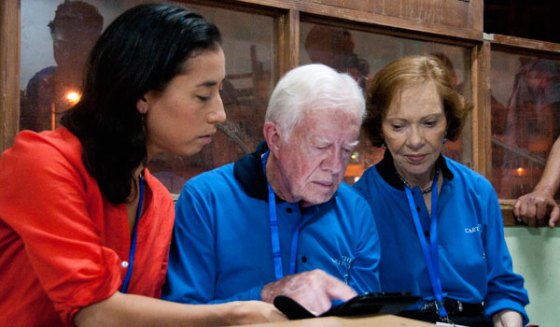At Naypyidaw’s invitation, the Carter Center and European Union have come to Burma to observe the general election. DVB speaks to Frederick Rawski, the Myanmar Field Office Director of the Carter Center, and asks him about his team’s mandate and how it will assess Burma’s polls.
Q: What are the priorities and goals of the Carter Center (CC) mission for these elections in Burma /Myanmar?
A: The goals of the Carter Center Election Observation Mission for the Myanmar general elections are: to provide an independent and impartial assessment of the electoral process, and to promote the integrity of the electoral process in accordance with international standards for democratic elections and good practice. Throughout the election period, the Center has been and will be releasing public statements with recommendations for improving the process. We will assess the election for compliance with Myanmar legislation and international standards and best practices for democratic elections. Our priorities are to assess how the right to vote is guaranteed in Myanmar and how conducive the environment is for participation in the political process.
Q: Please explain what the international observers will do, and what they won’t do.
A: The purpose of an election observation activity is to assess the extent to which an electoral process complies with international standards for democratic elections, whether national legislation reflects these standards, and how it is implemented. The objectives of election observation are to identify areas for improvements and to formulate concrete and operative recommendations that will support the efforts.
As observers, we meet with a variety of stakeholders involved in the process: election officials, government officials, political parties, candidates, civil society, media, and voters. With those stakeholders we discuss election preparations and learn of their concerns about the process. Observers also attend campaign events, monitor the adjudication of election disputes, observe the training of polling station officials, and key stages of the process such as voter registration and candidate registration.
Observers remain impartial at all times and do not support any participants in the election. Observers do not intervene in the process, offer advice or provide technical assistance. The Carter Center is an independent organisation and therefore we do not report to government authorities or election officials.
Q: To what degree will the CC team work with the observers from the EU mission? And with domestic observers?
A: The Carter Center election observation mission meets regularly with international and domestic civil society observation groups, both in Yangon and in the field. It is very useful for everyone to know where others will be observing so that we do not duplicate efforts. However, each group is free to make its own deployment plan in accordance with its methodology. The Carter Center will be observing throughout Myanmar.
Q: The CC has monitored more than a hundred general elections around the world. Under what kind of circumstances has the Mission rejected or declined to accept the election results?
A: It is the people of a country who ultimately determine credibility and legitimacy of an election process. It is our role to provide an independent, impartial and objective assessment of the process based on our observations.
[related]
Q: In practical terms, how does the network of observers work on Election Day?
A: On election day, our short-term observers will be deployed around the country in multinational teams of two with national staff to support their efforts. They will observe the entire process from the opening of the polls through to counting and tabulation. During the day, they will visit a number of polling stations and fill in observation forms, the data from which will be incorporated in the mission’s preliminary statement on the process. While in polling stations they will watch the process to observe the implementation of procedures, they will speak to election officials, candidate agents and other observers in the polling station, and they will note any incidents that occur in or around the polling station. The Carter Center will also have a team of election experts that will be following developments in Yangon and Naypyidaw, attending UEC [Union Election Commission] briefings and analysing the data we receive from the short-term observers.
Q: What does an observer do if he/she witnesses election fraud or infringements of the rules? Does he/she play the same role as an election monitor in these circumstances?
A: As election observers we do not intervene in the process; we observe how the process is administered and that includes observing, noting and reporting on any incidents of fraud or infringements directly observed by The Carter Center as well as how incidents or infringements are addressed by the election officials and other relevant authorities.
The terms ‘election observer’ and ‘election monitor’ are often used interchangeably. The Carter Center generally uses the term ‘election observation’, but also uses the word ‘monitoring’. Adherence to a credible methodology for impartially assessing an election process is more important than the terminology. The Center has established its methodology through the 100 elections it has observed in 38 countries since 1989. The methodology is based on the standards and commitments for democratic elections as set forth in international and regional documents.
The Center is a signatory to the Declaration of Principles for International Election Observation and the accompanying Code of Conduct. Adopted at the United Nations in 2005 and signed by 50 organizations, the Declaration of Principles provides detailed guidelines for credible international election observation. The declaration emphasises the need for independent, impartial, and fact-based observation and reporting, which does not interfere with the conduct of the electoral process.
Read The Carter Center’s initial report on the Burmese election campaign period HERE



